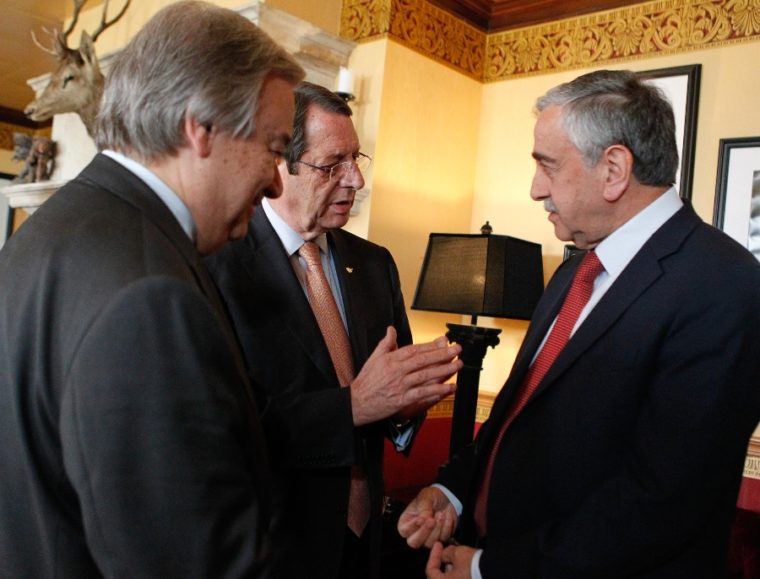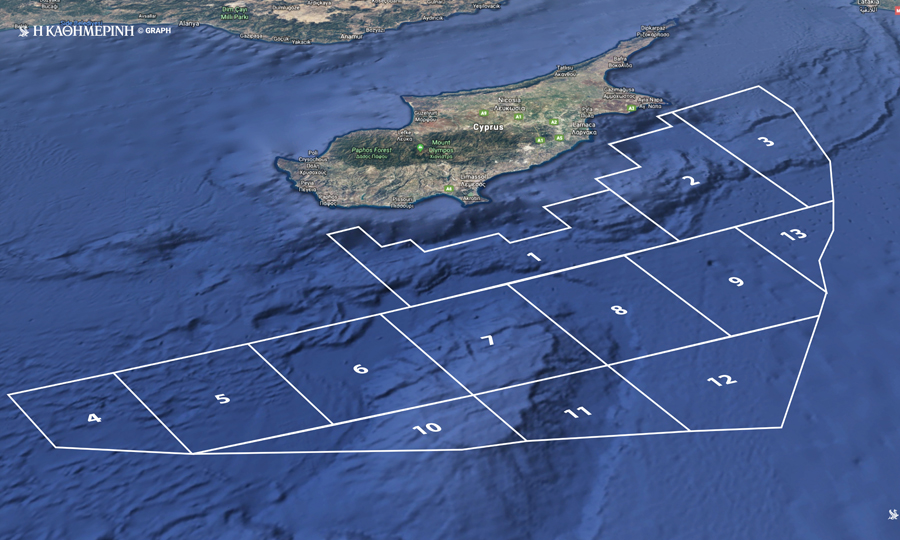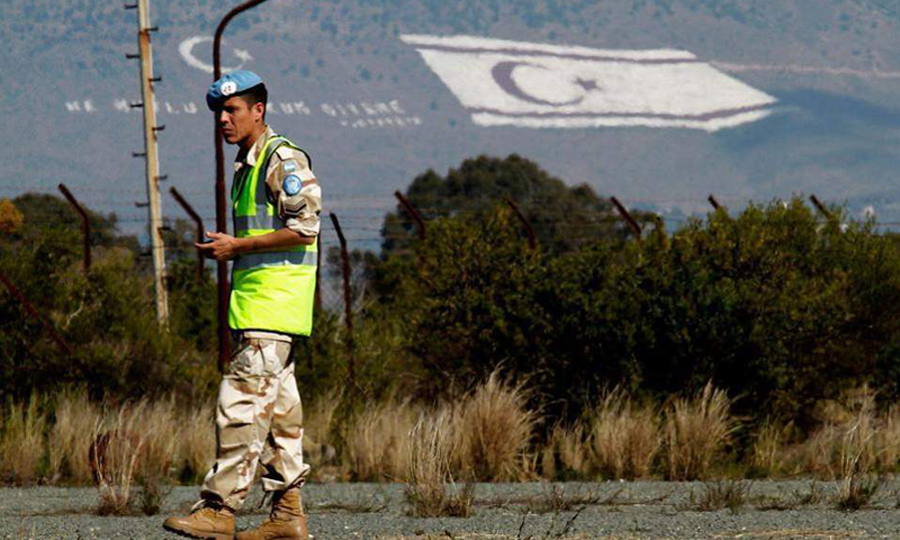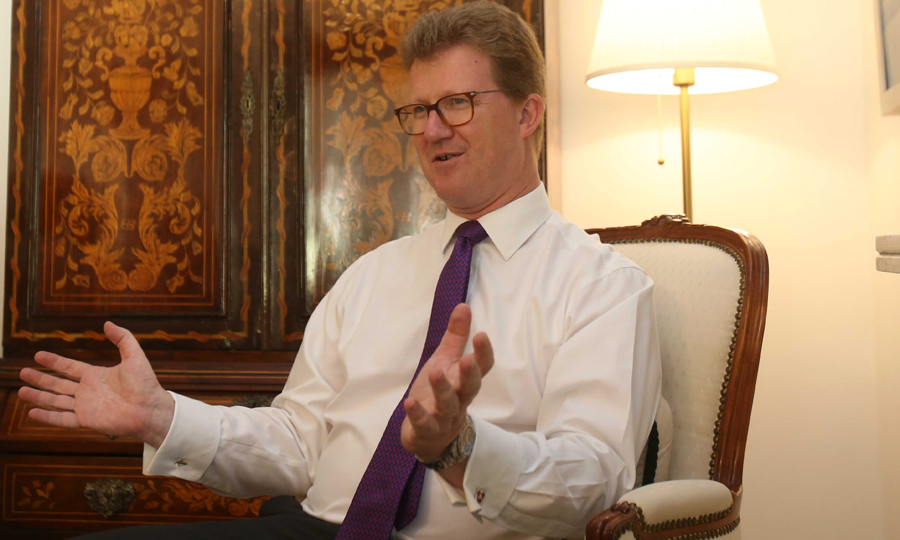
Newsroom / CNA
There is a clear plan A for Cyprus, that of a bi-zonal, bi-communal federation solution, and there is no plan B, UK High Commissioner in Nicosia, Stephen Lillie, has told the Cyprus News Agency (CNA), stressing that “for plan A to succeed the negotiations need to be well prepared, and the public opinion needs to be well prepared” as well.
Asked if options available are plan A or the division of the island, Lillie underlined that "division would be plan B and there isn`t a plan B,” and that “it is important that everybody involved seizes the opportunity now, before the momentum from Crans Montana is lost forever,” so that there is a decent plan that can be turned into a full agreement and can provide the basis for a lasting settlement and a lasting reunification of the island. Furthermore, he noted that “the status quo is not an option, unofficial division like we have now is not sustainable”.
In an interview with CNA, the British High Commissioner also referred to the situation of the Turkish Cypriot community`s economy, which as he noted, “is being badly affected by the tensions and by the turbulence in the Turkish economy,” stressing that this “is something that is important to reflect on.”
“It shows how interdependent the Turkish Cypriot and Turkish economies now are, and that is something that has happened over a period of years, and in the future this interdependence will continue and grow unless there is a settlement to the Cyprus problem. But often people talk as if there is no urgency to resolve the Cyprus problem,” the High Commissioner noted.
He went on to say that “the status quo in Cyprus is not static. As the northern part of Cyprus becomes more reliant on Turkey and as Turkish influence grows there, it becomes more difficult to reunify Cyprus. That’s I think something that all Cypriots need to reflect on,” he added.
“If you think it is difficult to resolve the Cyprus issue 44 years after the invasion, it will be even more difficult if your wait longer and longer. The longer you wait the less favourable the conditions will be,” he noted.
He expressed the conviction that a solution would be a win-win situation for both communities, because reunification would multiply the opportunities across the island, it would obviously allow the whole island to be part of the EU, with an integrated economy, and to play a much bigger role in the region.
Asked about the UNSG envoy Jane Holl Lute`s forthcoming meetings in London, in the context of contacts she is currently holding with all parties to the Conference on Cyprus, after which she will submit a report to the UN Secretary General, Lillie said that “we are looking forward to receiving Mrs Lute in London and to seeing the outcome of her consultations." He added that Lute has asked to hold meetings with the UK Foreign Secretary and the Minister for Europe that will take place soon, after summer vacation.

Replying to a question about the prospects for the resumption of the negotiations on the Cyprus problem, Lillie said that it is clear that the outcome of the Crans Montana talks was a setback. “On the other hand, progress was made within the talks in a number of areas and there is now an opportunity for the parties to come together again and to build on that and hopefully reach an agreement. Obviously, there is important work to be done to prepare for that. There has to be a proper preparation of the talks by all involved, so that an agreement can then be reached when the leaders come together, as well as a proper preparation of the public opinion, so that the agreement that the leaders reach can then be supported by the public in referenda,” he noted.
I don’t think, he added, anybody would say that what comes next will be easy “but I think that with good preparation and with a real focus on the issues it will be possible to make progress. And the UK government remains strongly supportive of a settlement based on the model of a bi-zonal, bi-communal federation as per relevant UN resolutions. We believe that that is the best and most practical solution to allow the reunification of Cyprus.”
Invited to say if he thinks that the thornier issue of the Cyprus problem is that of security and guarantees, the High Commissioner said: “I think the Cyprus problem is full of thorny issues. Security and guarantees is clearly a really very important issue for both Cypriot communities. Both Cypriot communities have their own respective views on what security means for them and there needs to be a lot of work done to bridge the gap between the two parties on security.”
Asked about the UK’s position as regards security and guarantees, which will be conveyed to Lute, Lillie said that specifically on guarantees the UK’s position is well known. “We have said that we are amenable to a solution around guarantees that is acceptable to all the parties, and that hasn’t changed,” he noted.
On security more generally, we share the view that a solution on security for one party cannot be at the expense of the security of the other. So, we need to work together to help reach a good solution that will leave both Cypriot communities feeling safe and secure in a reunited Cyprus, the High Commissioner said.
Asked if the UK is worried by speculation and media reports according to which Turkey is in favour of a confederation or a two-state solution in Cyprus, Lillie said that “with the Cyprus problem, as in many political issues, it is important not be misled by rumour and speculation”.
“Our clear view is that bi-zonal, bi-communal federation is the best available solution. It may not be perfect, but it is the best most practical available solution. It is easy when things are difficult for people to start throwing other ideas around, but those other ideas have their own complexities and challenges, and it is a long-standing position of the international community, as endorsed in many UN resolutions, that we don’t support a two-state solution,” the British diplomat said.

Asked about Turkey’s threats against Cyprus and drilling operations in its Exclusive Economic Zone (EEZ), as well as Turkish provocations in the Cypriot EEZ, Lillie said that the UK government’s position on this is well known and well documented. “We fully support Cyprus’ right to exploit the resources in Cyprus’ EEZ. We hope that these resources can be exploited for the benefit of all the Cypriot people, and we are strongly against provocative action by anybody.”
Invited to say if he thinks that possible future provocations could jeopardize the resumption of the Cyprus talks, Lillie said that the important thing for the talks is that everybody needs to remain cool-headed and focused, and prepare well for the talks.
“I recall that throughout last year, and the different rounds of talks, including Crans Montana, people were always worrying about whether tensions of hydrocarbons were going to affect that talks, but actually the talks happened and they weren’t derailed by hydrocarbons tensions,” he noted.
Asked if he thinks that tension between US and Turkey may affect relations in this area as well, Lillie said that Turkey is a very important country and power in this part of the world adding that the UK seeks to maintain an effective working relationship and partnership with Turkey. “I think at the moment the focus in Cyprus should be on the impact of the Turkish economic situation on the Turkish Cypriot community, ” he noted.

Asked about the UN peace-keeping force in Cyprus (UNFICYP) as the US administration has signaled that it wants to pull funding for UN peacekeeping forces around the world, Lillie noted that the UK and the other members of the Security Council worked hard to come up with a good resolution on the renewal of UNFICYP’s mandate and the decision was not to reduce the size of UNFICYP.
We’ve just agreed on this six-month mandate and in terms of UN processes “the focus is now on Mrs Lute’s consultations and the report that she will eventually submit to the Secretary General. So, I think that’s what we need to be focused on at the moment rather than speculating about the next UNFICYP mandate renewal,” he added.
Asked about the role of the civil society in efforts for the reunification of the island, the High Commissioner said that the civil society has a vital role to play in any conflict resolution or peacebuilding process. “The civil society can help carry out some of the confidence building measures that are needed, and it is necessary to engage civil society and indeed wider society in order to ensure that any solution that is reached at political level can then be implemented and is viable in society,” he noted.
“I think civil society can play a very valuable role. What we are talking about is Cypriot people taking responsibility for solving the Cyprus problem, not just waiting for somebody else to solve it,” he added.
He went on to say that “we are very much of the view that the Cyprus problem fundamentally needs to be resolved by the two communities, with the assistance of the UN and the international community.”
Asked about bilateral relations between the UK and Cyprus, Lillie said that he is very hopeful and optimistic about the two countries` relations. “Since I have arrived here as High Commissioner I have said on many occasions that my ambition is to build a modern, forward-looking relationship between Britain and Cyprus, a relationship that is built on the many positive foundations that we have. One of the most important foundations is the people-to-people links, a large Cypriot community in the UK, a large British community in Cyprus, the many people who go from Cyprus to study and many British who come here for tourism.”
He noted that "in the future we should do more to deepen and broaden the relationship across a whole range of areas that are related to the economy, to trade and investment, tourism, education, science and research but also to challenging issues around security and cooperation on counter-terrorism and on the other modern security threats that we face.”

Asked if Brexit could influence these relations in any way, the High Commissioner noted that there was a strong relationship between Cyprus and the UK before either Britain or Cyprus joined the EU. “We had a strong relationship as EU partners and I am confident that we will also have a strong relationship when Britain is outside the EU, because although we are leaving the structures of the EU we are not leaving Europe, we are not seizing to be European,” he added.
“We have the same values, both countries are committed to democracy, the rule of law, to human rights, to tolerance and diversity, they are both members of the Commonwealth, we have this vast array of personal connections. Of course, all of that will continue regardless of Brexit. What we want to avoid is an outcome to the Brexit negotiations that makes things more difficult. So, we want a strong and ambitious agreement between the UK and the EU on Brexit that allows many of our trading and economic links to remain, that allows our security and law enforcement cooperation to continue, and with that kind of agreements it will be even better for UK-Cyprus relations, that will remain strong whatever happens with Brexit,” Lillie said.
Asked about the negotiations between Cyprus and the UK on the British Bases in Cyprus, in view of Brexit, Lillie said that “we and Cyprus have a shared objective which is to ensure that in practice there is no change to the lives and the rights of Cypriot citizens who live and work in the Bases.”
So, we are having negotiations going on with Cyprus to resolve the final legal issues around that. I am optimistic that we will get an agreement, he noted.
Invited to say if he thinks the number of Cypriots studying in the UK will be influenced by Brexit, the High Commissioner expressed hope that it won’t be influenced, noting that there are around 10.000 Cypriots studying in the UK.
He stressed that anybody starting university this Autumn or applying this Autumn in order to start next Autumn will pay the same fees as other UK and European students, adding that the situation beyond that is still to be decided.
Asked about Cyprus’ role in the region as regards efforts to combat terrorism and to promote security, the High Commissioner noted that Cyprus is like a harbor bridge between Europe and the Near East and the Middle East. “So, it has an important role to play,” he added.
He went on to say that in order to play its full role as a harbor bridge, Cyprus needs to be reunited. “If Cyprus is reunified with access to all ports in the region including in Turkey it will be a real global centre for shipping and a full regional centre for hydrocarbons development if Cyprus can exploit hydrocarbons and then send these hydrocarbons not just to Egypt and to Israel but also to Turkey and Western Europe as well,” he noted.
Furthermore, he said that Britain and Cyprus and all the countries of Europe, regardless of EU membership, “face common security threats and the threat from international terrorism is one of those.”
So we are very determined that after Brexit we should still have a high-level of consultation and cooperation with Cyprus on counter-terrorism and on other law enforcement and security issues, he added.
We want to have strong relations for the post-Brexit era. “These relations will be stronger if the Cyprus problem can be resolved because reunification of Cyprus will open all sorts of new opportunities for the country, will ensure a great potential for Cyprus and I hope for the UK-Cyprus relations,” he stressed.
Cyprus, a full EU member state since May 2004, has been divided since the Turkish invasion of the island in 1974. The latest effort to reach a Cyprus settlement was concluded in summer last year in the Swiss resort of Crans-Montana without a result. Cyprus President Nicos Anastasiades expressed to the UN Secretary General`s envoy Jane Holl Lute, during a visit she paid recently to Cyprus, his readiness to re-engage into dialogue for a Cyprus settlement. Lute is also holding meetings in Athens, Ankara, London and Brussels on whether conditions have matured for the resumption of the Cyprus talks. She is expected to submit a report to the UNSG on her contacts with the interested parties.































